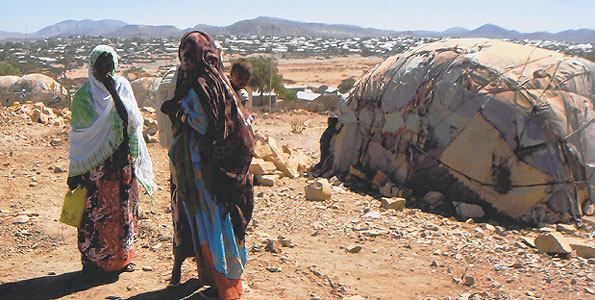|
Daily Nation Despite its name, the propeller-driven Dash flies slower than its companion, the Dornier jet – taking three hours or more from Nairobi's JKIA to Hargeisa. And for most of the time, you are flying over the parched yellow-browns of northern Kenya and into Somaliland. I was in for a surprise when we reached Hargeisa. The last time I was there was back in 1999, and my memory was of a smallish and rather ramshackle town. But it was a very proud town: capital of what was once the old British colony that had disentangled itself from the chaos of Somalia to the south and east (previously, the old Italian colony, but that's not the reason for the chaos, you'll understand). Yes, Somaliland had good reason to be proud. It had regretted its hasty decision at Independence in 1960 to join the ''Greater'' Somalia, and so activated one of the five points of the star on the new Somalia flag (the ones left out were Djibouti, the Ogaden in Ethiopia and, of course, north-eastern Kenya). After the rapid disintegration of Somalia following the fall of Siad Barre in 1991, Somaliland reverted to its old name, declared its independent statehood, and set about rebuilding its institutions and infrastructures. The minefields were cleared; order was restored; the roads were opened up; money flowed in from the diaspora by means of an informal but highly effective system based on trust; and a government was established through a concentrated series of consultations using traditional approaches to conflict resolution. But, concerned about the possible effects of creating a precedent, the rest of the world didn't recognise Somaliland's separateness. It still doesn't. Despite the progress the country has made. The progress is for anyone to see in Hargeisa now – in the expanded estates, the wide streets, the flamboyant buildings, and in the mushrooming advertising hoardings. It's not a Dubai, a Nairobi or a Kampala – but it's a world away from the devastation of Mogadishu. I wasn't able to properly explore the city because, though the threat to security is not at all as strong as it is to the east and south, it is still a possibility. And so I became a kind of prisoner in the Ambassador Hotel – a very comfortable place, I must say, in which to be a kind of prisoner. But on one of my six days, I was able to escape. We drove out west in a convoy to Borama, the capital of the Awdal region, and just 10 km from the border with Ethiopia. For over two hours, we travelled through a flat and fairly arid landscape, even though the rains had not long ended. ''When I was a boy,'' my Somali companion said, ''there were lots of trees along this way – many different varieties. But see how few there are now – and look at how the thorn bushes have taken over.'' We also passed two crippled and rusting tanks – reminders of the bitter civil war that had raged across these plains. Before this trip, I had re-read one of my favourite books about the Horn – Gerald Hanley's, Warriors: Life and death among the Somalis. A British officer during the Second World War, he was also a kind of prisoner, marooned in charge of a platoon of Somalis for months on end in the bush to the north of Mogadishu. This is how Hanley describes the people he had come to respect in more ways than one: ''Of all the races of Africa, there cannot be one better to live among than the most difficult, the proudest, the bravest, the vainest, the most merciless, the friendliest: the Somalis.'' And that is why I am looking forward to going back to Somaliland and Puntland a few times during the year ahead. John Fox is Managing Director of IntermediaNCG |
|---|
RESOURCE CENTRE OF DEMOCRACY, GOOD GOVERNANCE,TRANSPARENCY,ACCOUNTABILITY,AND HUMAN RIGHTS FOR EMERGING DEMOCRACIES IN THE HORN OF AFRICA AND THE MIDDLE EAST. THE BLOG IS TRI-LINGUAL: ENGLISH, SOMALI AND ARABIC. There is no democracy without effective opposition. And there is no effective opposition without free and independent media. CONTACT: samotalis@gmail.com
05 January, 2010
A world away from devastation of Mogadishu
A world away from devastation of Mogadishu
Subscribe to:
Post Comments (Atom)

No comments:
Post a Comment